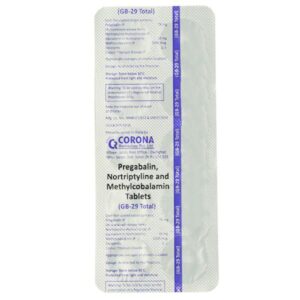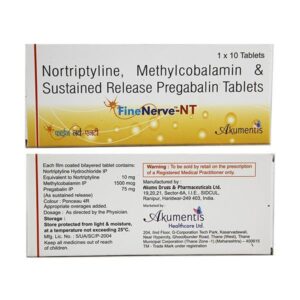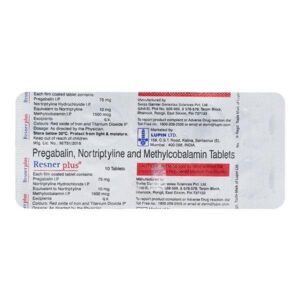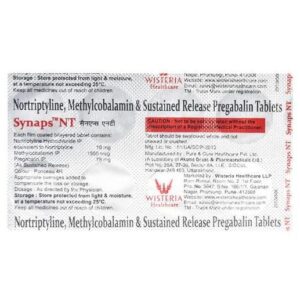METHYLCOBALAMIN + NORTRIPTYLINE + PREGABALIN
Methylcobalamin: Methylcobalamin is a form of vitamin B12 that is involved in the synthesis of DNA and the maintenance of nerve cells. It is commonly used as a dietary supplement or as a prescription medication for the treatment of vitamin B12 deficiency. Methylcobalamin is available in various forms, including oral tablets, sublingual tablets, and injectable solutions.
The main function of methylcobalamin is to provide the body with an active form of vitamin B12. Vitamin B12 is essential for the formation of red blood cells, the production of DNA, and the proper functioning of the nervous system. Methylcobalamin aids in the conversion of homocysteine to methionine, which plays a crucial role in various biochemical reactions in the body.
The recommended dose of methylcobalamin varies depending on the individual’s age, medical condition, and the severity of the deficiency. The typical dose for oral supplementation is 1000-5000 mcg per day, while injections may be given as a single weekly or monthly dose. Sublingual tablets are usually taken daily or a few times a week.
Methylcobalamin is generally considered safe and well-tolerated when used as recommended. However, some individuals may experience mild side effects, including nausea, vomiting, diarrhea, headache, or itching. These side effects are usually temporary and resolve on their own. Allergic reactions to methylcobalamin are rare but can occur in sensitive individuals, requiring immediate medical attention.
It is important to note that methylcobalamin is not suitable for everyone. Individuals with Leber’s disease, cobalt allergy, or renal disease should avoid the use of methylcobalamin. Additionally, it may interact with certain medications, such as metformin and anticonvulsants, so it is crucial to inform your healthcare provider of all the medications you are taking before starting methylcobalamin.
In summary, methylcobalamin is a form of vitamin B12 used to treat vitamin B12 deficiency. It works by providing the body with an active form of vitamin B12 that is essential for various bodily functions. The dose of methylcobalamin depends on the individual’s condition and can be taken orally, sublingually, or through injections. While generally well-tolerated, some individuals may experience mild side effects. It is important to consult with a healthcare professional before starting methylcobalamin to ensure its appropriateness for your specific situation.
Nortriptyline: Nortriptyline is a tricyclic antidepressant drug used primarily to treat depression. It may also be prescribed off-label for conditions such as chronic pain, fibromyalgia, and migraines.
The exact mechanism of action of nortriptyline is not fully understood, but it is believed to work by increasing the levels of certain neurotransmitters, specifically norepinephrine and serotonin, in the brain. By blocking the reuptake of these neurotransmitters, nortriptyline helps to restore the balance of chemicals in the brain, leading to improved mood.
The usual starting dose of nortriptyline for depression is 25-50 mg taken orally once daily at bedtime. The dose may be gradually increased by 25-50 mg every 3-4 days based on individual response and tolerability. The maximum recommended dose is usually not more than 150 mg per day. It is important to follow the prescribed dosage and consult with a healthcare professional before making any changes.
Common side effects of nortriptyline may include dry mouth, drowsiness, dizziness, blurred vision, constipation, weight gain, and urinary retention. These side effects are generally transient and may subside over time. Some individuals may also experience changes in sexual function, increased heart rate, low blood pressure, and confusion. It is important to report any severe or persistent side effects to a healthcare professional.
Nortriptyline may interact with other medications, including MAO inhibitors, SSRIs, certain antihypertensive drugs, and alcohol. Therefore, it is crucial to inform your healthcare provider about all the medications you are taking before starting nortriptyline.
As with any medication, it is recommended to follow the prescribed dosage, attend regular check-ups, and communicate any concerns or side effects with a healthcare professional.
Pregabalin: Pregabalin is a medication used to treat neuropathic pain, fibromyalgia, epilepsy, and anxiety disorders. It belongs to a class of drugs called anticonvulsants or antiepileptics.
The exact mechanism of action of pregabalin is not fully understood. However, it is believed to work by binding to calcium channels in the central nervous system, which reduces the release of certain neurotransmitters involved in pain signaling. By modulating the release of these neurotransmitters, pregabalin can help reduce pain signals and provide pain relief.
The dose of pregabalin varies depending on the condition being treated. For neuropathic pain and fibromyalgia, the usual starting dose is 75 mg twice daily or 50 mg three times daily. The dose can be increased to a maximum of 300 mg daily, depending on individual response and tolerability.
For epilepsy, the initial dose is usually 75 mg twice daily or 50 mg three times daily. The dose can be increased up to a maximum of 600 mg daily.
When used for generalized anxiety disorder, the starting dose is 150 mg per day, and it can be increased to a maximum of 600 mg daily.
Common side effects of pregabalin include dizziness, drowsiness, dry mouth, and blurred vision. Some individuals may also experience weight gain, swelling in the hands and feet, and difficulty concentrating. Less common but potentially serious side effects may include suicidal thoughts, allergic reactions, and changes in mood or behavior.
It’s important to follow your healthcare provider’s instructions and report any concerning side effects while taking pregabalin. Additionally, abrupt discontinuation of pregabalin may lead to withdrawal symptoms, so it is advised to gradually reduce the dose under medical supervision if discontinuing treatment.







